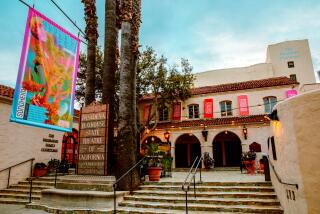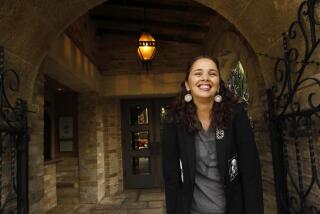Falcon Theatre Taps ‘Cobb’ to Lead Off Subscription Season
The Falcon Theatre in Burbank will produce its first subscription season, which will include the Los Angeles premiere of Lee Blessing’s “Cobb,” which played off-Broadway last year, and “Gretty Goodtime” by John Belluso, whose “Body of Bourne” was seen at the Mark Taper Forum last year. In addition, the theater has moved up the Actors’ Equity scale to a regular contract with the union, producer Garry Marshall announced Friday.
The season will include premieres of Ray Bradbury’s latest dramatization of his “Fahrenheit 451” (Oct. 26 through Nov. 17); “A Christmas Carole King,” in which the Troubadour Theatre Company will intertwine Dickens’ tale of Scrooge with Carole King songs (Dec. 7 through 29); and Mayo Simon’s “The Old Lady in Love,” starring Charlotte Rae and directed by Alan Mandell (Feb. 8 through March 2).
“Cobb” (Sept. 14 through Oct. 6), produced in association with Kevin Spacey’s Trigger Street Productions, revolves around the life story of baseball legend Ty Cobb, with three actors playing the title role at different ages. Belluso’s “Gretty Goodtime” (April 12 through May 4) is a play set in 1955 about a young German-born woman in a nursing home, directed by Joe Regalbuto.
The Falcon opened with 120 seats in 1997, but initially only 99 seats were used so that the theater could operate under Actors’ Equity’s 99-Seat Theater Plan, which requires only token fees for actors who are Equity members. In 1998, however, the theater’s children’s programming began using an Equity contract, and within the past year, two rental productions used Equity contracts. The theater’s capacity increased last year to 130.
Equity and the Falcon reached agreement on a long-term contract for the Falcon’s adult productions earlier this year, and the agreement was first used last month, for “The Sunshine Boys” and “A Night in November.”
“It’s going to cost more, but we have a better shot to maybe make some more,” Marshall said, especially if hit shows can be moved to larger venues. “I’d rather gamble on me and my staff than the stock market.”
More to Read
The biggest entertainment stories
Get our big stories about Hollywood, film, television, music, arts, culture and more right in your inbox as soon as they publish.
You may occasionally receive promotional content from the Los Angeles Times.










